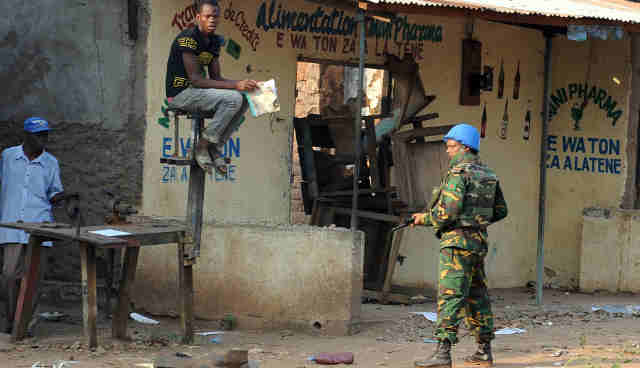
Is Central African Republic (CAR) matured to hold a free and fair poll? After enduring a series of delays, this time the elections in CAR may actually take place. Despite the lack of resources and ongoing insecurity, voters in the CAR will be heading to the polls on Wednesday, in a closely watched election that is seen by some as the country’s best chance to end its ongoing political crisis.
The presidential and parliamentary vote comes two weeks after people in the CAR successfully voted for a new constitution – even if critics say that most citizens were unlikely to have known what the reforms stood for.
Since the coup in March 2013, thousands of people have been killed and around a million forced to flee their homes – be it internally or into neighbouring DR Congo, Chad and Cameroon.
The new government will be tasked with reuniting a nation scarred by severe communal violence between Muslims and Christians, rebuilding its economy and disarming rival armed groups who still rule large swathes of the country.
In the interim however, questions still remain over the authorities’ capacity to hold free and fair elections.
Al Jazeera spoke to Souleymane Ndiaye, the former prime Minister of Senegal and the Head of the African Union’s (AU) Election Observer Mission, to the CAR to get a sense of the preparations ahead of the polls on December 30.
Al Jazeera: There are many concerns that the CAR is not ready to hold elections. Is there pressure to ensure the vote takes place?
Souleymane Ndiaye: To me, the government and the international community accepted to hold this election on December 30, and it is up to the government to make sure everything is ready. I met the current president, the minister of foreign affairs and I will meet the PM on Monday. Everyone I have met is ready to hold this election. It will be tense, but it will be [a] regular election.
Al Jazeera: Are you convinced all measures are in place for elections to take place?
Ndiaye: I met with the UN Head in CAR, to talk about the election preparations and training of staff and the set up of polling stations. He told me that all the material is en route to every polling station. You can appreciate that there is some insecurity here, and so there were delays, but all is now on track.
Al Jazeera: There is likely to be violence during the election. How much violence are you willing to tolerate before deciding on the legitimacy of the polls?
Ndiaye: This is the first election I will be monitoring […] but I know how elections work. I [surely] cannot compare it to the experience in Senegal or DR Congo or elsewhere in Africa. But we will not tolerate any violence of any type during the elections. The UN is ready for anything that might take place on the day. But I would say the situation is close to normal. It will be a good election. From what I understand, everything will be ready by December 29.
Al Jazeera: Where will the monitors be based during the election period?
Ndiaye: We congratulate the election commission and AU for having so many of us to cover the elections. We are now 40 observers. There are 17 districts across the country and we will be sending two or three to every district.
Al Jazeera: How does one hold an election when so many are still displaced across the country, and elsewhere?
Ndiaye: I don’t know […] my mission is to listen, and protect the values of the election. At this point I don’t have any particular concerns. After the 30th, we will evaluate how it was done and inform the AU of our findings.
Follow Azad Essa on Twitter
[Al Jazeera]
Support InfoStride News' Credible Journalism: Only credible journalism can guarantee a fair, accountable and transparent society, including democracy and government. It involves a lot of efforts and money. We need your support. Click here to Donate
